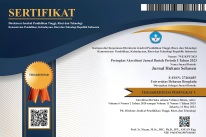WASIAT WAJIBAH BAGI ANAK ANGKAT PADA MASYARAKAT KOTA BENGKULU
Abstract
In the implementation of the removal of the child was still there a legal provision that still has not been uniform. Legal provisions concerning adoption spread into some legal rules, both written and unwritten. Such a situation certainly raises issues regarding the legal effect of such adoption particularly for children who are removed. In this case the focus is on the author's research was borrowed against adopted children in the city of Bengkulu. This research will explore how the implementation of child adoption in Bengkulu city communities and how the implementation of the adopted child was borrowed in the city of Bengkulu. This study aims to determine the implementation of the adoption and implementation of the city of Bengkulu was borrowed foster child in the city of Bengkulu. This study uses empirical juridical approach. This approach aims to understand that the law is not merely as a set of rules of law that are normative but the law is understood as public behavior that mengejala in life. Qualitative approach, in which the research is expected to produce data deskreptif form of data written or oral from the people and behaviors that can be observed. This study concludes that the adoption of children in the city of Bengkulu amicably implemented according to local customs without going through the trial process. This is because the proceedings were perceived by the public is quite complicated and time consuming. Avoid this process generally removal of the child in the city of Bengkulu much happens in a family without getting the determination of the court and the division of property in a will or estate community habits adopted children in a family to adopt a child through a process based on the applicable rules of customary law applicable to public The. This is in accordance with the rules of fiqh which states can be defined as customary law (العادة المحكمة).
Keywords: Was Borrowed, Adopted Children, City Bengkulu






